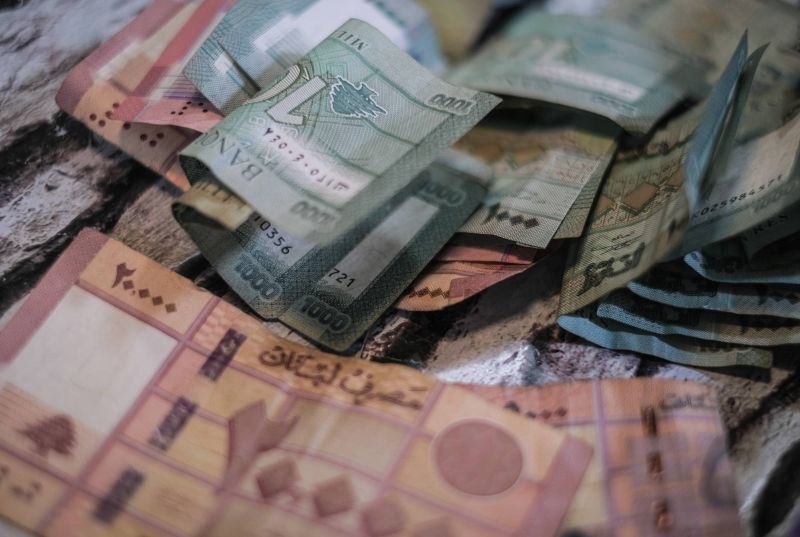
(Credit: Joao Sousa/L'Orient Today)
- Gains from value-added taxes (VAT) to make up 77 percent of expected revenues for Lebanon’s government, which experts, politicians and members of civil society deemed outrageous.
- The adopted budget is set to have no deficit: critics have deemed it an unrealistic endeavor.
- The budget used a rate of 89,000 Lebanese lira to the US dollar for most calculations, marking a significant step towards the unification of the country’s exchange rate. The text scrapped every reference to the LL15,000 and LL1,507.5 official rates to the dollar when calculating taxes and other administrative charges.
2- A draft law was leaked on Friday revealing plans to address the issue of bank restructuring and the distribution of the country's more than $70 billion in financial losses.
The draft law stressed the following:
- Make foreign-based banking groups — to whom the Lebanese market represents only a portion of their clientele — assume the losses linked to the collapse of the Lebanese system directly, without passing on the burden to their customers.
- Distinguish between foreign currency deposits that existed before October 17, 2019 and those that were built up afterward. The plan calls for banks to guarantee the gradual repayment of deposits of up to $100,000 to depositors in the case of the former, and only $36,000 in the case of the latter.
Different options to deal with "unprotected" deposits will be available.
These include:
- Bail-in: the exchange of a portion of the deposits owed against a stake in the bank's capital. This applies to a portion of deposits exceeding $500,000. Note that one dollar from the deposits concerned is worth a quarter of a real dollar.
- Voluntary "lirification" (i.e. conversion into Lebanese pounds) of a portion of deposits exceeding $100,000. However, the conversion rate will be equivalent to 20 percent of the market rate.
The draft was not discussed at Thursday's Council of Ministers meeting and the text has not been placed on the executive agenda yet.
3- Électricité du Liban announced a change in its tariffs.
The news was revealed in a press release on Feb 6. Certain subscription fees have been waived, and the exchange rate to calculate tariffs into lira has been aligned with the market rate (LL 89,500 to the dollar), after having been calculated at Sayrafa + 20 percent for a long time.
The public supplier also announced that subscribers will be able to pay their bills in dollars, a first since its creation in 1964. Lebanese administrations and public institutions are not normally able to demand payments in foreign currency, except in cases provided for by law.
4- Banque du Liban introduced Circular No. 166 on Saturday, de facto replacing Circular No. 151, under which depositors will be able to withdraw $150 in US dollars each month from dollar-denominated bank accounts opened between Oct. 31, 2019 and June 30, 2023.
Access to dollar bank deposits in Lebanese banks has been subject to informal capital controls since the depth of the country’s financial crisis became apparent in 2019.
5- The Purchasing Managers Index (PMI), which measures the month-on-month change in economic activity within the manufacturing and services sectors, recovered in January, with a score of 49.4 points.
It seems to be picking up again after it scored a total of 48.4 points at the end of 2023, its lowest level since January 2023. The Lebanese private sector was growing skeptical in the wake of recent geopolitical uncertainties, but it seems that it's starting to become encouraged to expand its ventures again. The Index is published each month by BlomInvest and Markit.
6- Banque du Liban (BDL) published Basic Circular no. 167, which requires banks to convert several categories of assets denominated in foreign currency at a rate to be set by a foreign exchange platform, like the Bloomberg or Sayrafa platforms.
According to Nadim Daher, a certified public accountant and treasurer of the Lebanese Business Leaders Association (RDCL): “This will solve all the visibility problems on the banks’ accounts and, indirectly, of all other companies. Auditors will no longer be obliged to issue unfavorable opinions on financial statements in audit reports because they are contrary to international accounting standards.”
7- Lebanon ranked 149th out of 180 countries, and 14th among 19 Arab countries on the Corruption Perception Index for 2023, published by Transparency International, a global anti-corruption advocacy association. The rankings are based on a score from zero (highly corrupt) to 100 (very clean). Lebanon’s score was 24/100 in 2023
In contrast, Lebanon placed 150th globally, and 14th place regionally, on the 2022 index. The index assesses the perceived degree of public sector corruption in every country.